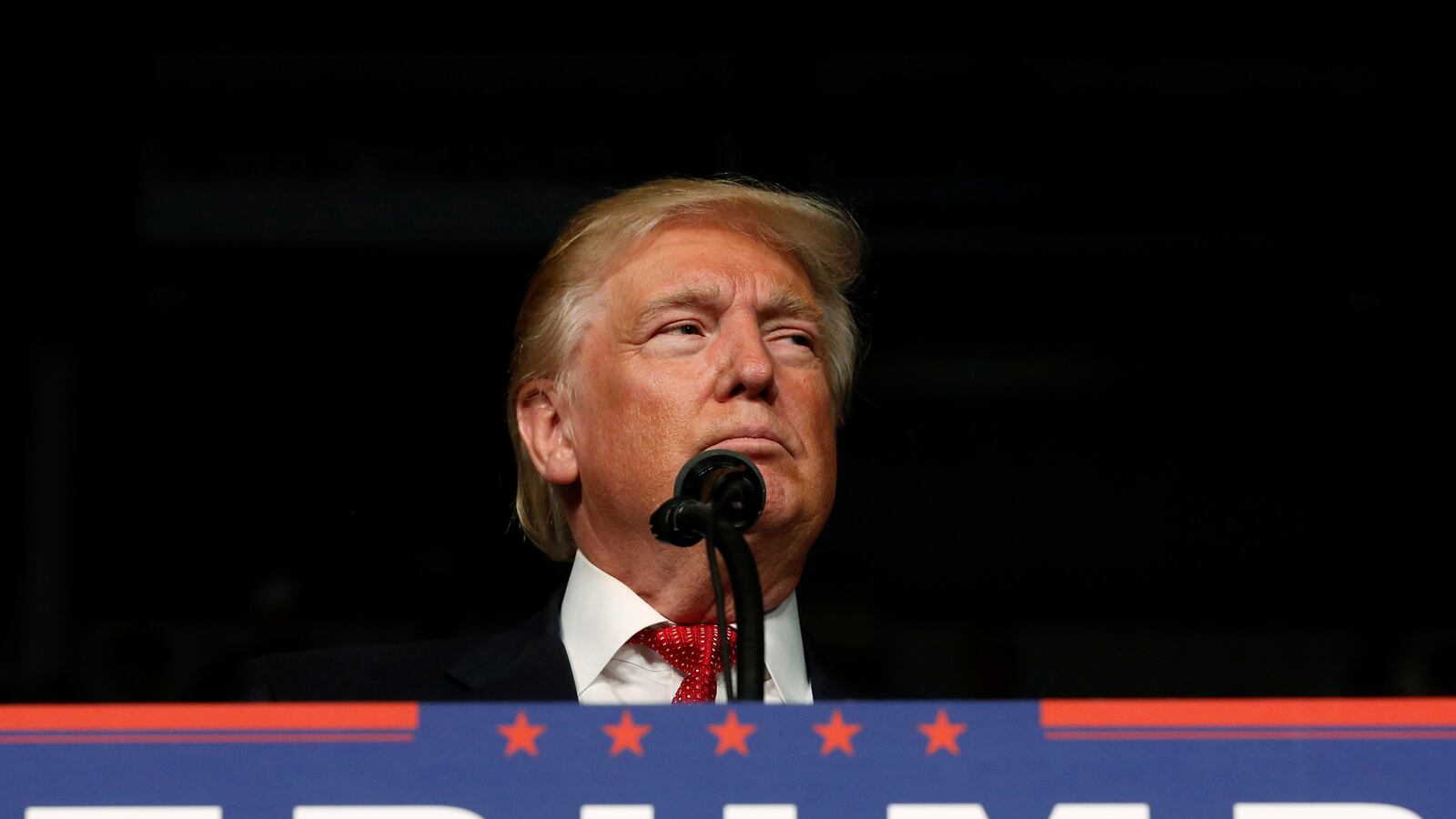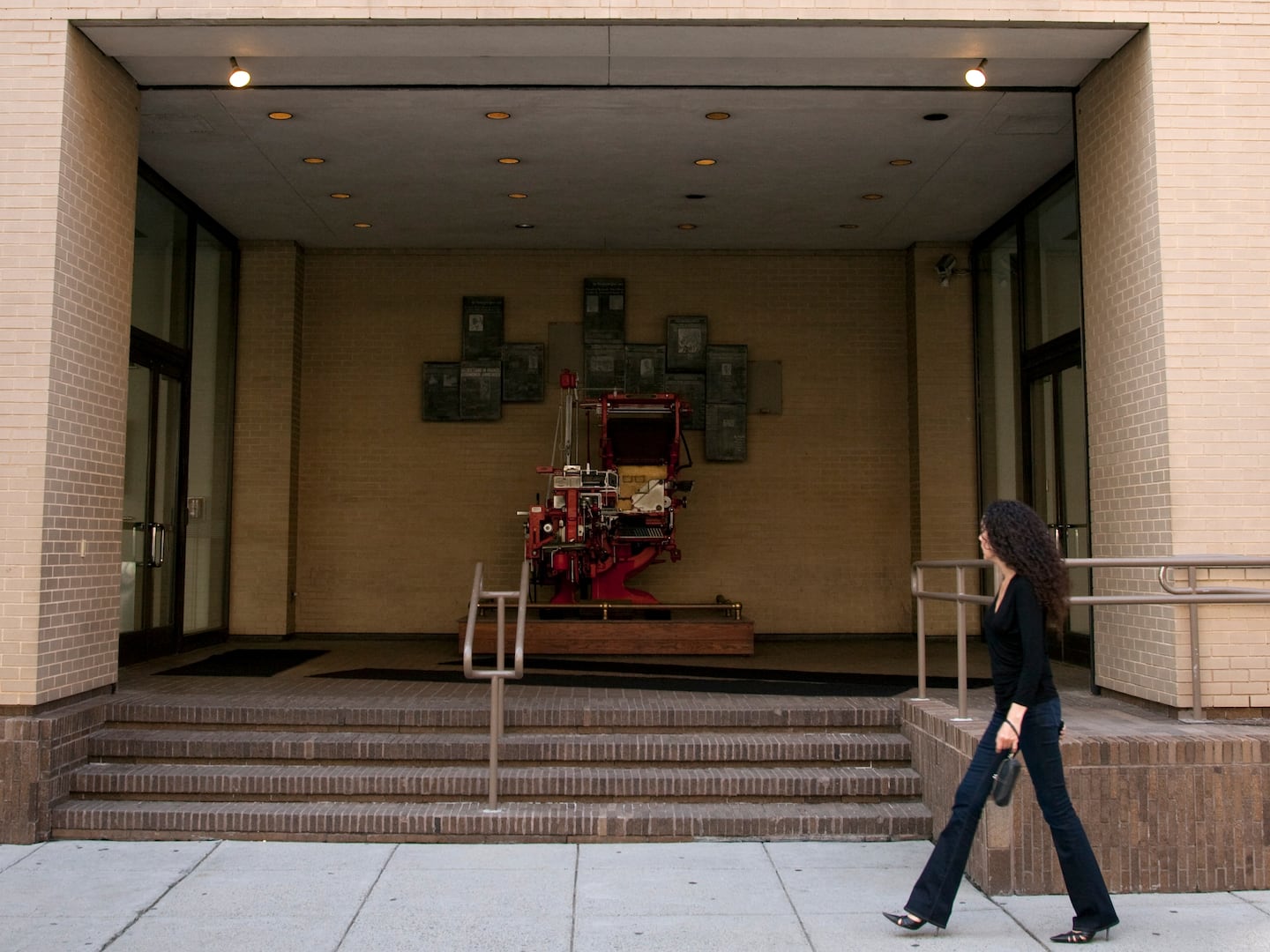Donald Trump’s supporters clearly don’t care about his scandals, outrages, and lies—he’s the Teflon candidate.
But prosecutors aren’t so forgiving, and Trump’s alleged bribery of Florida’s Attorney General, Pam Bondi, has caught their attention and the attention of Democrats in Congress. My colleague Joy-Ann Reid has called the scandal “Trump’s Benghazi.”
But could Donald Trump really be convicted of bribery?
The answer is surprisingly unclear, but a review of the relevant law suggests that the Justice Department could easily get an indictment against him—and in terms of the election, that alone might be enough to matter.
Most of the facts at issue are undisputed. It’s undisputed that Bondi asked Trump for a donation in 2013, just as she was considering whether to join a multi-state probe into allegations of fraud involving Trump University. It’s also undisputed that on Sept. 17, 2013, the Donald Trump Foundation donated $25,000 to a pro-Bondi group. And, finally, it’s undisputed that Bondi subsequently decided not to join the investigation.
That sure looks suspicious. But the one disputed point is whether there was any relationship between the donation and the decision not to investigate.
On the one hand, Bondi’s office has staunchly denied any connection between the donation and the non-investigation. Her office told Fortune magazine that “there was never any recommendation by the staff to investigate or sue Trump University, and consequently, the matter never rose to the Attorney General’s level for any decision of any kind.” It seems implausible that such an important decision would be made by staff alone; it was a high-profile investigation of a close associate whom Bondi had just recently solicited for a donation. But that’s their story. Likewise, Trump’s spokespeople have said there was never a quid-pro-quo.
On the other hand, Trump has boasted about how he gives money to politicians and then “When I want something, I get it. When I call, they kiss my ass.” Of course, paid ass-kissing is not illegal. Arguably, it’s how Washington works. But the timing of the gift and the fortuitous result are powerful circumstantial evidence that a more specific kiss was implicit in the exchange.
Really, there are two alleged violations here, which map onto two different investigations: one by New York’s attorney general, Eric Schneiderman, and the other on the one that 15 Democratic members of the House Judiciary Committee have requested from the Justice Department.
Scheiderman’s investigation is about the misuse of the Trump Foundation. First, as a 501(c )(3) nonprofit foundation, it is not allowed to engage in political activity. Second, the donation was basically self-dealing: Trump had his foundation pay his political contribution. That violates every nonprofit law in the books.
For these infractions, the Trump Foundation has already paid a $2,500 penalty to the IRS (and been reimbursed by Trump personally), and Trump has reimbursed the $25,000 to the foundation. Spokespeople for the foundation say that this was all a clerical error, and that the beneficiary was confused with another entity with a similar name.
Now, Schneiderman is investigating whether these actions violated nonprofit laws in New York, where the foundation is registered, in addition to IRS regulations.
However, as an analysis by Fortune revealed, the penalties for this infraction are relatively minor. It could become a campaign issue, but legally speaking, it’s not egregious enough for the foundation to be shut down. The penalty is basically just a fine, like the IRS already assessed.
The bribery accusation, however, is totally different.
If the Trump Foundation’s donation was meant to influence Bondi’s decision, then Trump himself could be found guilty of bribery. That’s what the fifteen Democrats on the House Judiciary Committee have said, in their recent letter to Attorney General Loretta Lynch, requesting an investigation into the matter.
Congressman Jerrold Nadler, the lead signatory of the letter, told The Daily Beast that “the facts here beg the question of whether or not these payments influenced the Florida Attorney General’s official decision not to participate in litigation against Mr. Trump… If true, then that would be a violation of a number of criminal statutes, including bribery, perjury, and deliberate failure to disclose transfers to the IRS.”
On the question of bribery, the state of the law is surprisingly vague. The words of the federal bribery statute are clear. The relevant part reads: “Whoever, directly or indirectly, corruptly gives… anything of value to any public official… to influence any official act” is guilty of bribery.
But what do “corruptly” and “influence” mean, exactly? Obviously, donors are always trying to influence official acts; that may be corrupt in a broad sense, but if it were bribery, every Fortune 500 executive would be in jail. Thus, while the Supreme Court ruled in 1991 that campaign contributions can count as bribery—the bribe doesn’t have to be some secret exchange of unmarked bills in an envelope—it has also held since 1976 that there must be some specific quid pro quo. Latin aside, the cash must be in exchange for a specific, identifiable action.
The big open question (again, quite surprisingly) is how explicit that quid pro quo must be; in 1991 the Court ruled that it must be explicit, but lower courts have divided on exactly how explicit. Is a wink and a nod enough, if, as in Trump/Bondi, there’s a pending matter in front of the public official? Must there really be hard evidence of a specific exchange for a bribe to be proven?
That would be a high standard. Most politicians aren’t stupid; they don’t leave paper trails of documents that say “Thank you for your donation. I agree not to prosecute you.” But there must be something more than just the gift.
In one recent case, Don Siegelman, the former governor of Alabama, was found guilty of accepting a bribe when a healthcare facility magnate donated to a pet cause of his and was subsequently renamed to a hospital facility planning board. Siegelman said he didn’t know he was violating the law, and 113 former state attorneys urged the Supreme Court to resolve the “unacceptable and counterproductive ambiguity” in bribery law. But the Court declined to hear the appeal, and Siegelman went to jail.
So what about Trump and Bondi?
If the investigation leads to an indictment and trial, the case will almost surely go to the Supreme Court. The Court’s precedents are unclear, and the case would be too big, and too close, a case for anything less.
Assuming there is no smoking gun (and Trump and Bondi would be idiots if they left one), the Court will have to decide if there was an explicit enough quid pro quo, despite Trump’s and Bondi’s protestations to the contrary. The case could really go either way. (Indeed, the case is stronger against Bondi, who solicited the donation while she knew her office was debating whether to investigate Trump. Bondi has also continued to make highly dubious claims about the matter.)
It seems clear, however, that there is ample evidence for an investigation, and most likely for an indictment—either of which would likely impact the presidential campaign. The timing of the donation and the decision not to investigate, Bondi’s solicitation, the use of the foundation rather than Trump personally, and Trump’s numerous brags about buying influence—put together, these provide a strong inference of malfeasance.
Such circumstantial evidence does not prove bribery beyond a reasonable doubt. But it certainly justifies an investigation to see if more evidence exists. And given the ambiguity of what the law actually requires, it might be enough to justify an indictment as well, if the investigation turns up any evidence at all.
“The fact of the matter is,” Congressman Nadler said, “Donald Trump has bragged on numerous occasions that this is how he conducts his business—using money to influence politicians. And while that may be normal business for Mr. Trump, it is not legal business and should be prosecuted if such allegations have merit.”






